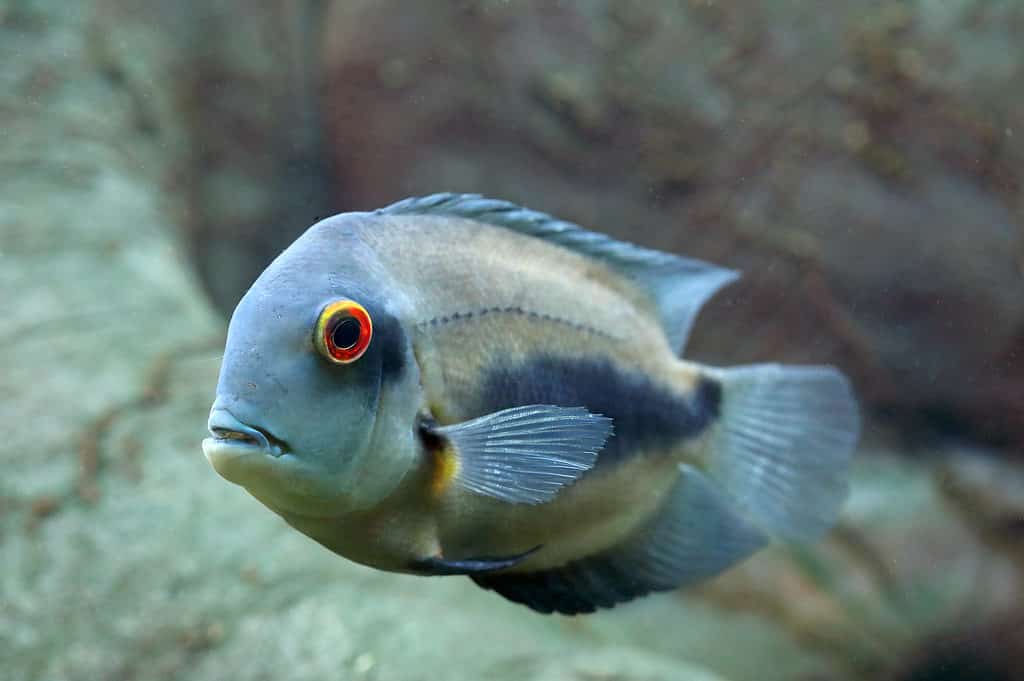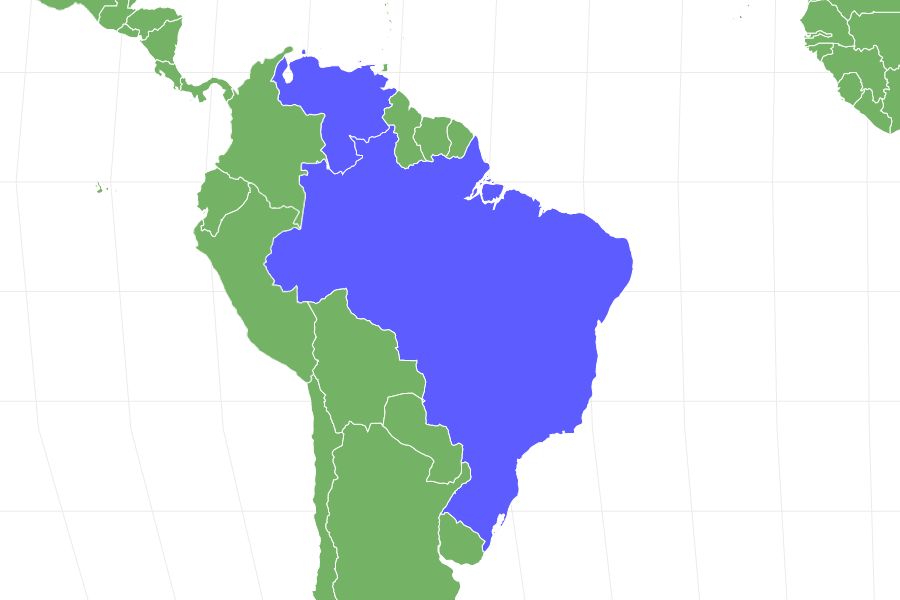Uaru Cichlid
Uaru amphiacanthoides
The color of the Uaru cichlid changes during the spawning season
Advertisement
Uaru Cichlid Scientific Classification
- Kingdom
- Animalia
- Phylum
- Chordata
- Class
- Actinopterygii
- Order
- Perciformes
- Family
- Cichlidae
- Genus
- Uaru
- Scientific Name
- Uaru amphiacanthoides
Read our Complete Guide to Classification of Animals.
Uaru Cichlid Conservation Status
Uaru Cichlid Facts
- Prey
- Worms, crustaceans, insects
- Name Of Young
- Fry
- Group Behavior
- Solitary except during mating season
- Fun Fact
- The color of the Uaru cichlid changes during the spawning season
- Most Distinctive Feature
- Dark-colored patch on the side of their body
- Distinctive Feature
- The row of the spines in the fish's dorsal fin gives it a triangular shape
- Other Name(s)
- Chocolate cichlid, Triangle cichlid, Waroo
- Optimum pH Level
- 5.0–7.0
- Incubation Period
- Five (5) days
- Age Of Independence
- One week
- Average Spawn Size
- Between 100 and 400 eggs
- Habitat
- Tropical blackwaters and whitewaters of South America
- Diet
- Omnivore
- Favorite Food
- worms, crustaceans, insects, detritus, fruit and plant matter
- Type
- Ray-finned fish
- Common Name
- Uaru
- Special Features
- the fish can change color during mating season and as it grows older
- Origin
- South America
- Number Of Species
- 2
- Location
- They can be found worldwide as pets in aquariums but are native to South America
Uaru Cichlid Physical Characteristics
- Color
- Yellow
- Multi-colored
- Skin Type
- Scales
- Lifespan
- 8–10 years
- Weight
- 3lbs
- Length
- 10-12inches
- Age of Sexual Maturity
- 5 months
- Venomous
- No
- Aggression
- Low
View all of the Uaru Cichlid images!
The color of the Uaru cichlid changes during the spawning season.
Summary
Uaru cichlid is a freshwater fish native to the Upper Orinoco and the Amazon basins in South America. The fish is popular for its unique triangular shape and coloring, unlike any other fish in the cichlid family. Although native to South America, you can find Uaru species in aquariums all over the world.
5 Uaru Cichlid Facts
- The Uaru is one of the least aggressive cichlids.
- The average lifespan of an Uaru is about 8 to 10 years.
- Male and female Uaru cichlids have similar appearances, and it’s difficult to tell them apart.
- The color of this fish changes during the spawning season.
- It is an intelligent fish. The Uaru may even be able to recognize its feeders.
Uaru Cichlid — Classification and Scientific Name
The Uaru is a genus of small to medium-sized cichlid fish native to the blackwaters and whitewaters of South America. The name “Uaru” is the local Amazonian word for toad. The Uaru fishes have a number of nicknames. The native name of this fish is Waroo. People call them “triangle cichlids” in reference to the triangular shape of the adult and “chocolate cichlid” (a name it shares with Hypselecara temporalis, another species of cichlid fish).
The Uaru belongs to the order Cichliformes, which includes two families. The cichlid family is the largest in this order and one of the largest vertebrate families. There are more than 202 genera in this family, with about 1,700 species identified so far.
Types of Uaru Cichlid
The Uaru genus lives naturally in the wild in South America. Hobbyists also keep them as pets in aquariums all over the world. This genus has two main species: Uaru amphiacanthoides and Uaru fernandezyepezi.
- Uaru amphiacanthoides: This is a cichlid species native to the streams of the Amazon River Basin in South America. Uaru amphiacanthoides can reach lengths of up to 10 inches or more. Native people eat this fish, but it is also a popular pet in aquariums.
- Uaru fernandezyepezi: This species of Uaru lives in the Orinoco Basin. It typically grows to a maximum size of about 9.4 inches. Although it is also found in the aquarium trade, it is less common than the other variety.
Uaru Cichlid Appearance — How To identify Uaru Cichlid

The average lifespan of an Uaru is about 8 to 10 years.
©Grigorii Pisotsckii/Shutterstock.com
The Uaru has an oval disc-shaped body typically of cichlids. However, the row of the spine in the fish’s dorsal fin gives it a more triangular shape. This is why people call it the triangular cichlid. The Uaru has a long anal fin which is nearly as long as the rest of the fish’s body. The long anal fin makes it a powerful swimmer.
Uaru species demonstrate different coloration depending on their age. Juvenile fish are often a bland color with a mottled pattern. This dull coloration is an important camouflage that helps to protect this fish. The color makes them look like dead leaves, so larger fishes ignore them.
As the fish matures, the color turns from a subdued gray-brown to yellowish color. It may also have small brown blotches. The eyes of large mature fishes are typically bright yellow with black pupils. The fish typically has a large tear-shaped black mark running across the lower end of their body, as well as a smaller mark at the base of the tail. The mark can be distinct or subdued from one individual to the other. Uaru species have scaly bodies. However, the small size of these scales makes the fish’s body smooth and leathery. The small size of these scales gives their body a smooth and leathery appearance.
In its natural habitat, the Uaru can grow to lengths of up to 12 inches, but it only grows to about 10 inches in a tank. Adult Uaru changes color just before spawning season. The color of their entire body becomes darker, with a bit of brown coloration along the edges. Their yellow eyes also become reddish, giving the fish a fiercer appearance.
Uaru Cichlid — Distribution, Population, and Habitat
Uaru cichlid is native to South America. The two species in this genus have varying ranges and distributions. Uaru amphiacanthoides are found in the clear streams of the Amazon Basin in Northern Brazil and Guyana. Uaru fernandezyepezi, on the other hand, is found in the Orinoco Basin in Venezuela and Colombia.
In the wild, this freshwater fish is mainly found in blackwaters and whitewaters. As a popular fish in the aquarium trade, this fish is also bred in captivity. It is best kept in a large, roomy aquarium with gravel or sand as a substrate. The tank is typically decorated with roots and bogwood.
Since they’re raised in home and commercial aquariums, Uarus are not at risk of extinction. It is listed as a species of Least Concern on the IUCN red list, which means the population is relatively stable and not under threat.
Uaru Cichlid — Evolution and History
Fishes are the first vertebrates to have ever evolved. The ancestors of modern fishes first appeared about 530 million years ago during the Cambrian explosion. The earliest fishes were primitive filter-feeders. It wasn’t until the Late Ordovician that the first fishes with defined jaws appeared. They became more widespread during the Devonian, which is commonly referred to as the “age of fishes.”
The ray-finned fishes (class Actinopterygii) evolved about 420 million years ago. They’re the dominant vertebrate group today. Within this group, the family Cichlidae is the biggest and most diverse. They arose within the order of Cichliformes about 100 to 80 million years ago.
Cichlids are renowned for their rapid evolutionary radiation and diversity across different habitats. There are several instances of their lineage evolving the same traits and even reversion to ancestral traits within the family.
Uaru Cichlid — Predators and Prey
The Uaru is an omnivore, which means it eats anything from small fish, shrimps, worms, and aquatic plants.
What Eats Uaru Cichlid?
Uarus don’t have a lot of natural enemies. They are mostly threatened by humans, who catch them for food. They are also preyed on by other bigger fishes within their ecosystem.
What Does the Uaru Cichlid Eat?
In its natural habitat, the Uaru cichlid is an omnivore that eats crustaceans, insects, detritus, worms, fruits, and plants. In home aquariums, the fish is not a picky eater. It can be fed with frozen bloodworms, live earthworms, black worms, frozen brine shrimps, blanched lettuce, and peas.
Uaru Cichlid — Reproduction and Lifespan
Both male and female Uaru cichlids appear very similar to one another. This makes it difficult to distinguish between them. They reach maturity between five and six months and then move in pairs to mate. During the breeding season, their appearance changes to a darker color with coppery red eyes.
The female produces between 100 and 400 eggs and lays on a flat rock surface for the male to fertilize. The pair (male and female) take turns guarding the eggs against predators. Males eat non-viable eggs. However, in some cases, they may end up eating the entire clutch.
The Uaru eggs hatch within five days and are then moving to a shallow nest by their parents, feeding them with secretions from their skin for a week. Once the fry starts swimming, they become independent of their parents. However, the fry still stays close to the parent. The average lifespan of the Uaru cichlid is between 8 and 10 years.
Uaru Cichlid in Fishing and Cooking
Uaru fishes are native to South America, especially in the Amazon and Orinoco Rivers. They are not endangered and are relatively common in their native habitat. Natives consider them important food fish. It is mainly kept as a pet in other regions of the world. They are mostly sold in pet stores and can also be purchased online.
Related Animals
View all 16 animals that start with UUaru Cichlid FAQs (Frequently Asked Questions)
Where are Uaru cichlids found?
Uaru cichlids are found naturally in South America’s Amazon Basin and Orinoco Basin. They live in clear water tributaries and blackwaters in these regions.
How long do Uaru cichlids live?
Uarus have an average lifespan of about 8 to 10 years when properly taken care of.
What do Uaru cichlids eat?
Uaru is an omnivore fish. It can be fed with anything from worms and shrimps to plants and fruits. They are not picky eaters.
How fast does Uaru grow?
The Uaru grows quickly. It can grow up to one to two inches in four to six weeks. The fish has an average lifespan of about 10 years.
Thank you for reading! Have some feedback for us? Contact the AZ Animals editorial team.
Sources
- Meet The Pet, Available here: https://meethepet.com/uaru/
- Aquatic Community, Available here: https://www.aquaticcommunity.com/cichlid/uaru.php
- Animal World, Available here: https://animal-world.com/encyclo/fresh/cichlid/UaruCichlid.php
- Bad Man's Tropical Fish, Available here: https://badmanstropicalfish.com/uaru-cichlid/

















